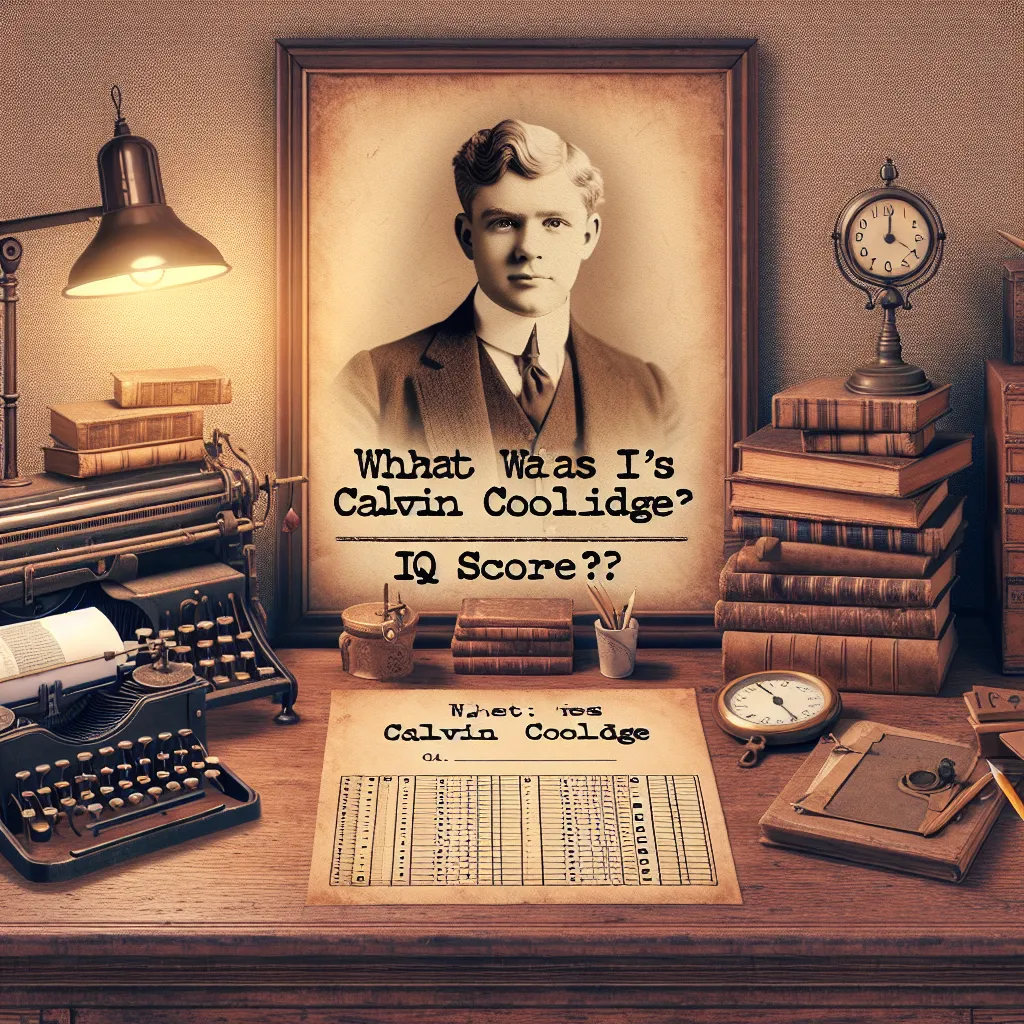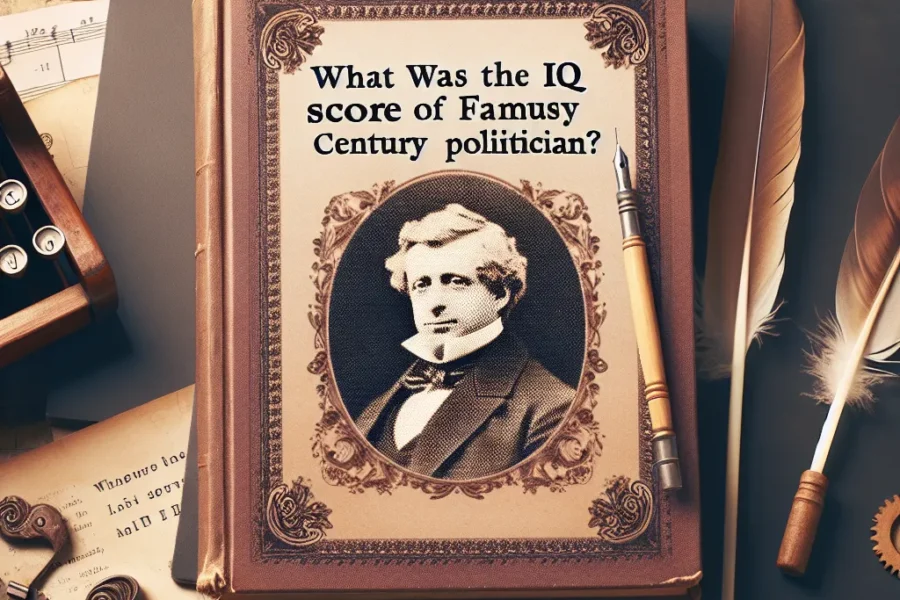Calvin Coolidge, the 30th President of the United States, served from 1923 to 1929, a period marked by rapid economic growth and social change known as the “Roaring Twenties.” Coolidge is often remembered for his calm and quiet demeanor, earning him the nickname “Silent Cal.” However, one question that has intrigued historians, scholars, and the general public alike is: what was Calvin Coolidge’s IQ score?
If you are looking for legitimate IQ Tests which pass the entry bar for Mensa, see our IQ Tests.
Determining historical IQ scores is a challenging and often speculative endeavor as intelligence testing and the concept of IQ were not as well-defined or widely administered during Coolidge’s time as they are today. Therefore, no official records of Calvin Coolidge’s IQ score exist. However, we can attempt to estimate an individual’s intelligence based on their educational background, achievements, writings, and the views of their contemporaries.
Calvin Coolidge was born on July 4, 1872, in Plymouth Notch, Vermont. He was brought up in a modest and hardworking family, which laid the foundation for his pragmatic and disciplined approach to life. Coolidge attended local schools before enrolling in Black River Academy. His academic pursuits then led him to Amherst College in Massachusetts, where he demonstrated strong intellectual capabilities.
At Amherst, Coolidge distinguished himself not only academically but also as an active participant in various extracurricular activities. He was known for his keen analytical skills and introspective nature, attributes that later influenced his political career. His education at Amherst was rigorous, encompassing a broad liberal arts curriculum designed to cultivate critical thinking and intellectual breadth. Coolidge graduated cum laude, which suggests a high level of scholastic achievement.
Although IQ tests were not a part of Coolidge’s academic journey, we can infer that his performance at a reputable institution like Amherst would likely place him in the upper echelons of intellectual ability. The cumulative academic rigor and the intellectual environment at Amherst were instrumental in shaping his future endeavors, both personal and professional.
One of the most salient indicators of Coolidge’s intelligence is his ability to navigate the complex political landscape of his time. After earning his law degree by apprenticing under a local attorney, rather than attending a formal law school, Coolidge quickly made a name for himself in Massachusetts politics. His career trajectory was marked by a series of progressively more important roles, from city councilman to state legislator, mayor, and lieutenant governor, eventually culminating in his governorship of Massachusetts.
During his time as governor, Coolidge gained national recognition for his handling of the Boston Police Strike of 1919. His stance that public safety employees should not strike because of the essential services they provide was articulated in a manner that showcased both his moral and philosophical considerations. His logical reasoning and eloquence contributed significantly to his reputation as a skilled orator and a man of principle. This incident propelled him into the national spotlight and secured his place on the Republican ticket as vice president in 1920.
When President Warren G. Harding died unexpectedly in 1923, Coolidge assumed the presidency. His tenure as president was characterized by a focus on limited government, fiscal conservatism, and support for business. Despite his public image as a man of few words, Coolidge was an astute and effective communicator when he chose to be. His ability to convey complex ideas succinctly and his administrative acumen are indicative of high cognitive abilities.
Analyzing Coolidge’s written works and speeches also provides insights into his intellectual capabilities. He penned an autobiography, “The Autobiography of Calvin Coolidge,” which is not only a recounting of his life but also presents his thoughts on governance, philosophy, and personal ethics. His writings reflect clarity of thought, a deep understanding of the principles of democracy, and an ability to communicate effectively with a broad audience.
Economic historians and scholars have often debated Coolidge’s policies and their impact on America. Known for his laissez-faire approach to government and the economy, Coolidge believed in reducing unnecessary government intervention. His administration cut taxes and reduced federal expenditures, reflecting his belief in fiscal discipline. While his policies were successful in the short term, leading to a period of economic prosperity, some argue that they also set the stage for the stock market crash of 1929 and the subsequent Great Depression.
Nevertheless, the implementation of these policies required a sharp intellect and a nuanced understanding of economics. Coolidge’s ability to balance the budget, reduce national debt, and maintain a surplus speaks to his meticulous and analytical nature. His political philosophy—grounded in the belief that government should interfere as little as possible in the lives of its citizens—required a high level of intellectual rigor to apply in practice.
Furthermore, Coolidge’s contemporaries held him in high regard for his intelligence. Political colleagues and opponents alike noted his clear-mindedness and strategic thinking. His reputation for honesty, integrity, and wisdom earned him respect across the political spectrum. This is another strong indicator of his intellectual capacity, as earning such a reputation in the highly contentious and competitive field of politics is no small feat.
While it’s true that IQ scores provide a measure of certain cognitive abilities, they do not entirely encapsulate an individual’s intellectual prowess or capacity for leadership. In Coolidge’s case, his achievements, writings, and the respect he commanded from his peers paint a picture of a highly intelligent and thoughtful individual. Although we do not have a definitive IQ score, the evidence suggests that Calvin Coolidge possessed significant intellectual abilities that contributed to his success as a lawyer, politician, and president.
In conclusion, while there is no official record of Calvin Coolidge’s IQ score, evaluating his academic background, political career, writings, policies, and the high regard of his contemporaries leads us to surmise that he was indeed a person of considerable intellect. His methodical and principled approach to both his personal and professional life demonstrated a high level of cognitive acuity. Coolidge’s legacy, therefore, is not just that of a silent and reserved leader but also of a deeply intelligent and capable statesman.



Leave a Comment